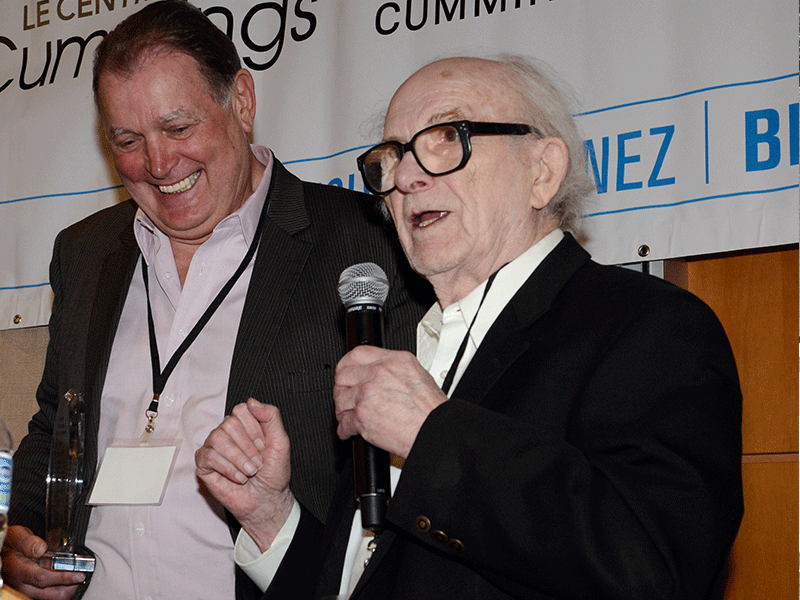Red Fisher started covering the Montreal Canadiens on March 15, 1955. That would have been a plum assignment for any young sports journalist, but two days later, the infamous Richard Riot broke out in the streets.
The revered Maurice Richard had been suspended for the rest of the season, including the playoffs, by NHL president Clarence Campbell, over an altercation he had with a linesman.
Historians will say that this violent protest was a turning point in English-French relations in Quebec, and that it foreshadowed the nationalist movement.
Fisher, the son of a Russian immigrant shoemaker (his given name was Saul), recognized a story when he saw one. It’s little wonder that he would make a very long career out of chronicling the Canadiens. He was on the frontlines for the team’s dynasty years, from the late 1950s, through the ’70s.
Fisher, who died at age 91 on Jan. 19, would remain on the Canadiens beat for 58 years, first with the Montreal Star and later with the Gazette, from which he retired as a columnist in 2012, at age 85.
READ: WELL-KNOWN JEWS NAMED TO ORDER OF CANADA
He became more than a beat reporter – he was an astute observer of human nature and had a writer’s flair for telling stories filled with drama. Every game was about more than who won and lost; for Fisher, hockey was life, with all its struggles and sweetness, its villains and saints.
He wrote a book, Hockey, Heroes and Me, which was published by McClelland & Stewart in 1994.
Fisher actually wrote his last article in 2015 – a touching tribute to his close friend, former Canadiens left-winger Dickie Moore.
In late December, Fisher was named a member of the Order of Canada “for his contributions to sports journalism, notably for his iconic coverage” of Montreal’s hallowed hockey team.
Throughout his career, Fisher seemed to always be ahead of the big story, thanks to his sources and his instincts, but he eschewed gossip and rumour. He was always sure to get the scoop and was outspoken, even though his opinions were often unpopular.
Fisher had no patience for players who responded with clichés – which many did, of course – and ignored rookies.
Côte-St-Luc councillor and writer Mike Cohen recalls that, “Watching Red cover a Habs game in the press box was something else. He generally paced back and forth, barely taking notes.… I loved to watch him fire questions away to the players, coaches and GMs, and see the respect he generated. He usually stood there with his arms crossed.”
Fisher has been described as curmudgeonly and even eccentric, but with a heart of gold hiding under his gruff exterior. The love of his life, Tillie, his wife of 69 years, died just 10 days before he did.
Fisher recalled the 1972 Summit Series between Canada and the Soviet Union as the most memorable event of his career, due to the emotion it generated. He became the first Canadian sports writer to travel to the U.S.S.R., the land of his ancestors, earlier that year, to report on what the upcoming series meant to ordinary people – a rare entrée into what was then a very closed world.
Born in Montreal, Fisher worked for the Montreal Standard, the Montreal Herald and the Star on a part-time basis, before being offered a full-time job in 1954. He was working at Northern Electric at the time, and said he would only leave that secure position if he could cover the Canadiens.
In 1969, he was named the Star’s sports editor (for a brief period), but never gave up his daily column.
After the Star folded in 1979, Fisher was hired by the Gazette.
He won three National Newspaper Awards throughout his career. In 1985, he was awarded the Elmer Ferguson Memorial Award by the Hockey Hall of Fame, which is presented to “distinguished members of the newspaper profession whose words have brought honour to journalism and to hockey.”
In 2010 he was inducted into the Quebec Sports Hall of Fame. In 1999, he was elected to the International Jewish Sports Hall of Fame.
Three years ago, Fisher was feted as a legend of local sports journalism at the annual Sports Celebrity Breakfast benefitting the Cummings Jewish Centre for Seniors, where he received the inaugural Larry Fredericks Media Award.
At 88, Fisher brought down the house when he asked former Canadiens centre Peter Mahovlich, who earned 773 points in his career, whether he thought he should be in the Hockey Hall of Fame.
“You’re a funny guy, a great player and you disliked Scotty Bowman – that should qualify you,” quipped Fisher, referring to the Stanley Cup-winning, but abrasive, former coach.
